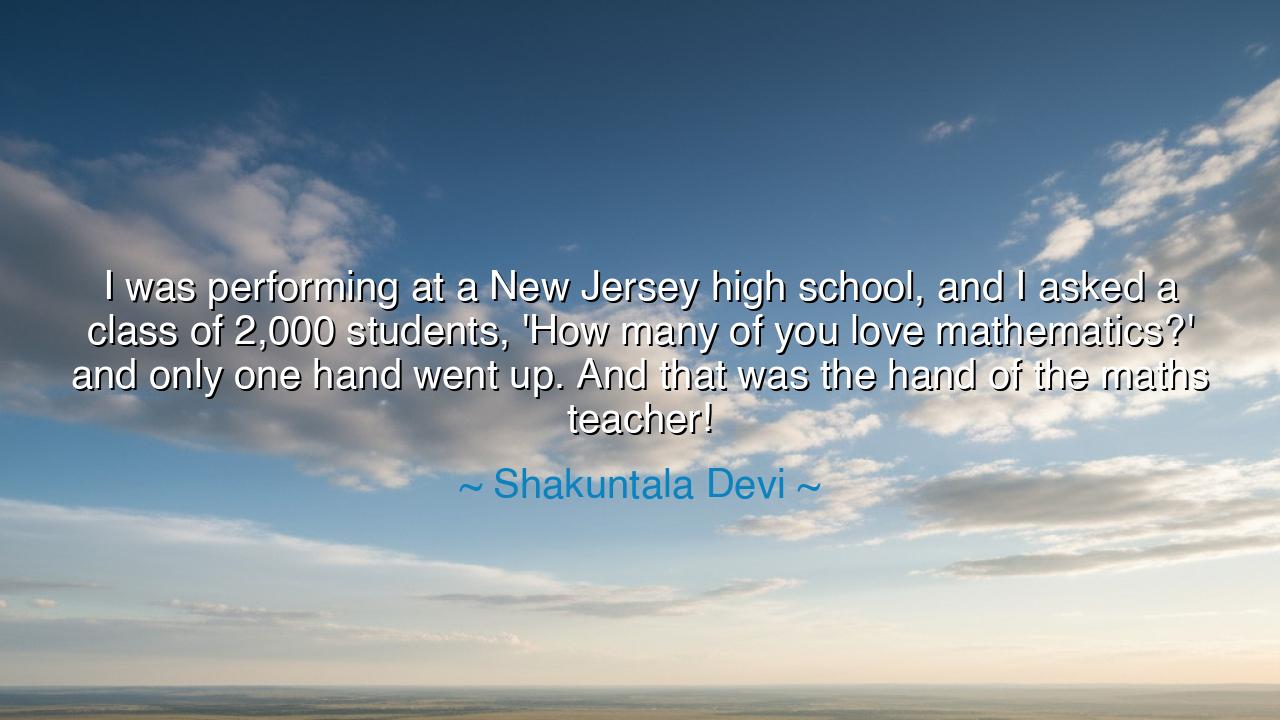
I was performing at a New Jersey high school, and I asked a
I was performing at a New Jersey high school, and I asked a class of 2,000 students, 'How many of you love mathematics?' and only one hand went up. And that was the hand of the maths teacher!






Shakuntala Devi, the “Human Computer,” once recounted with a mixture of humor and sorrow: “I was performing at a New Jersey high school, and I asked a class of 2,000 students, ‘How many of you love mathematics?’ and only one hand went up. And that was the hand of the maths teacher!” In this simple story lies a profound revelation: that a subject so vast, so noble, so eternal as mathematics — the very language of creation — has become a burden rather than a joy for many. The silence of 1,999 students is not merely a classroom moment; it is the echo of a culture that has lost sight of the wonder within numbers.
The ancients would have wept to hear it. For to the Greeks, mathematics was not drudgery, but a pathway to the divine. Pythagoras called numbers the essence of all things, and Plato inscribed above his Academy’s gate: “Let no one ignorant of geometry enter here.” To them, the patterns of the universe — the orbits of stars, the harmony of music, the proportions of art — were woven together by the fabric of mathematics. How tragic, then, that in our modern age, the same discipline inspires not awe but dread, not love but silence.
The meaning of Shakuntala Devi’s words is therefore twofold. On the one hand, they expose the failure of how mathematics is often taught: as a rigid system of formulas, rules, and examinations, rather than as a living, breathing wonder. On the other hand, they awaken us to the responsibility of teachers, whose task is not to force facts upon unwilling minds, but to kindle curiosity, to reveal the beauty of the subject, and to transform fear into fascination. The single hand of the maths teacher raised among thousands becomes a symbol of both faith and isolation — a lone voice crying out for the joy of numbers.
Consider the tale of Hypatia of Alexandria, one of the great mathematicians of antiquity. She did not drill her students with endless calculations; she led them into the mysteries of geometry and philosophy, teaching that mathematics was the pathway to truth and beauty. Her classroom overflowed with seekers, who loved not only the numbers but the vision that numbers revealed. Hypatia’s tragic death did not silence her influence, for her students carried her spirit forward. She proves to us that when mathematics is taught as wonder, it ceases to be dreaded and becomes loved.
The challenge for us, then, is not whether the world needs mathematics — for every bridge, every building, every digital device, every journey to the stars proclaims its necessity. The challenge is whether the world can learn once again to love it. For what is learned in fear is soon forgotten, but what is loved becomes part of the soul. Shakuntala Devi’s story is not about numbers, but about the human heart’s estrangement from its own heritage of wonder.
The lesson is clear: we must return to the roots of learning. If you are a teacher, do not present mathematics as chains of symbols, but as keys to unlock the mysteries of the world. If you are a student, do not shrink before its complexity, but seek in it the patterns that govern stars, rivers, and the beating of your own heart. If you are a parent, do not speak of it as a dread subject, but share in its puzzles as you would share in a story or a song.
Practical actions flow from this. Explore the hidden beauty of numbers in music, in art, in nature’s spirals and branching trees. Show children how mathematics lives not only in the classroom but in their games, their rhythms, their very breath. Encourage questions, not only correct answers. Make of mathematics not a prison, but a playground. In this way, the next time such a question is asked in a hall of 2,000 students, not one hand will rise, but thousands, testifying that the love of numbers has been rekindled.
Thus Shakuntala Devi’s story, lighthearted yet piercing, must not be forgotten. The lone raised hand of the maths teacher is a warning and a call. It warns us of how far we have fallen from reverence for the beauty of mathematics. But it calls us also to restore it, to teach and to learn in such a way that the numbers shine again with their original glory — as the eternal language in which the universe itself was written.






AAdministratorAdministrator
Welcome, honored guests. Please leave a comment, we will respond soon